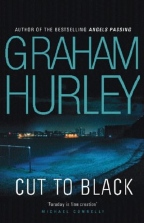Cut to Black
Graham Hurley
Orion
UK Trade paperback First Edition
ISBN 0-75282-098-9
Publication Date: 10-21-2004
358 Pages; £9.99
Date Reviewed:11-05-04
Reviewed by: Katie Dean © 2004

REFERENCES
COLUMNS
|
|
|
Cut to BlackGraham HurleyOrionUK Trade paperback First EditionISBN 0-75282-098-9Publication Date: 10-21-2004358 Pages; £9.99Date Reviewed:11-05-04Reviewed by: Katie Dean © 2004 |

|
|
REFERENCES |
COLUMNS |
'Cut to Black' is a gritty crime novel set in contemporary Portsmouth. It is the fifth in a series of books by Hurley featuring the police detectives D/I Joe Faraday and D/C Paul Winter. The novel employs a complex plot and is well written and highly realistic. For anyone already familiar with Hurley's work, this novel will not disappoint.
The story focuses on the police battle to overcome the escalating drugs problem in Portsmouth. Yet it is far more complex than this single theme suggests. Hurley interweaves views of the drugs culture from a wide range of angles; there is the successful businessman, Bazza McKenzie whose fortune has been built from selling drugs, the dealers on the street, the users and all those whose lives are affected by drug abuse. On the opposite side, Faraday and Winter are employed on two separate cases attempting to combat the problem whilst Faraday's girlfriend and son are shooting a film to be sent round schools in an attempt to stem the problem at its source. Hurley acts rather like the circus performer, keeping multiple plates spinning, moving seamlessly between the different strands of his story to create a complex yet meaningful whole.
Hurley also pushes a more political agenda. This crime novel is, above all, realistic. The police investigations are not the sanitized affairs of some crime novels, nor the thrillers of others. Hurley's police officers are real people with all the foibles and hidden or selfish agendas that one might expect to find. The world of Portsmouth policing is highly politicized with officers facing enemies amongst their own ranks as well as amongst the criminal population. Hurley manages to draw out the complexities of modern policing, the constant battle for adequate funding and the rivalry between officers and departments that can be such a destructive force. The pace of the action matches this realism. The story meanders along, never reaching any thrilling climax, but always offering new twists and turns as each angle of the plot is unfolded.
As a mini subplot, Hurley cannot resist adding his own particular view of wider events in England. The action takes place in the spring of 2003, at the time the combined US and British forces were set to 'liberate' Iraq. The progress of this event is interspersed amongst the action, allowing Hurley to present the commonly held view of many of those who opposed the war. In this respect this novel has a far wider historical importance. It captures the view of a sector of English society at a pivotal moment in world history.
Finally, it is worth mentioning Hurley's characters. For fans of this novelist, they will need no introduction. Faraday and Winter employ very different approaches to policing. The first is the man with the social conscience, the latter a more maverick officer who is concerned as much with his own career as with catching the criminals. Hurley draws his characters well, but all are rooted in the lower echelons of society and all exhibit the same sense of anger and frustration that ultimately creates an air of 'sameness' throughout the novel. There is no light-to-dark shading. In this respect, the novel does not create the impact that it might. The conversation of every character is liberally sprinkled with expletives, to the extent that the reader becomes so used to them that their real impact is utterly lost. The lasting impression of the novel is one of darkness and despair. This is a world in which society is powerless to halt its destruction in an ever-downward spiral of drug abuse and crime. It is certainly not a novel that the Portsmouth tourist board would wish to use to promote the city!
'Cut to Black' is the kind of novel that polarizes opinion. Readers will either love it or hate it. Hurley writes well and has created a disturbingly realistic portrayal of contemporary Portsmouth. To some this gritty writing will greatly appeal, to others its lack of escapism will be depressing. However, in both cases by the end of the novel, the reader is left with plenty to think about regarding the contemporary drugs problem. It is not a simple issue and its impact upon the whole of society is far- reaching.